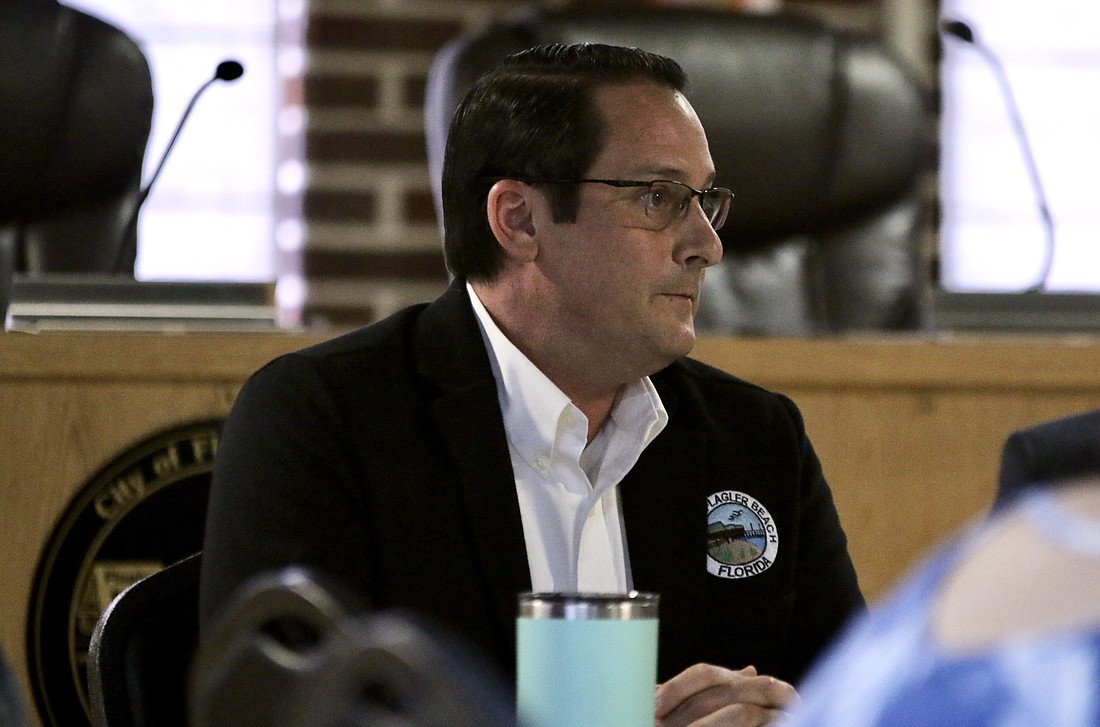- December 28, 2024
-
-
Loading

Loading

The Flagler Beach City Commission is considering changing the mayor position to allow it a vote on the commission.
Commission Chair Eric Cooley requested the discussion item at the Dec. 14 meeting and said he’s proposing the change because Flagler Beach residents, in his experience, are shocked to find out the mayor does not have a vote. He suggested the decision be placed in the hands of residents on a ballot.
“I'm of the opinion … this is a very antiquated form a government. To have an elected official, that can't vote … to me, it never made sense,” Cooley said. “I thought, it's time that we get, kind of, caught up to the current century.”
The commission will hold an informative workshop meeting on the topic before deciding. This would not be for the upcoming March election, Cooley said.
The Flagler Beach City Commission has five commissioners and the mayor, who does not have a vote on the board, according to the city charter. While the mayor position does not have a vote, it does have the right to veto ordinances and resolutions.
Mayor Suzie Johnston said her position is primarily ceremonial, even though residents often come to her asking for support on commission items. Without a vote, she said, she doesn't have a way to effect change.
“I can't make any decisions for residents,” Johnston said.
She said has caused her to “consider the tenure” of her term as mayor. The mayoral seat is one of two seats up for election in 2024.
Commissioner James Sherman said he’d like to see a voting mayor but also like the idea of an informative workshop. The other three members of the board were more cautious about the proposed changes.
Cooley said a ballot vote would allow the residents to decide.
“‘Do we want to hear from our residents,’ is kind of the main question,” he said. “I've heard enough that, you know, they want our mayor to be able to vote.”
City Attorney Drew Smith said this form of governance was modeled after the branches of state and federal governments. If given a vote, Smith said, the elected mayor is usually the commission chair.
“Many times, the mayor will be the one at large seat at a dais,” Smith said. “The mayor is the one person that everybody gets to vote for.”
The commission currently elects its own chair. Commissioner Jane Mealy said keeping one elected position as commission chair could lead to a “dangerous situation.”
“I’ve seen mayors become very self-important people because they’re going to run the meetings,” she said.
Changing the mayoral position to allow a vote opens the doors to other questions: Would it mean the city would need to eliminate a commission district seat, to retain the five voting members? What would that mean for term lengths and election cycles?
All six elected positions are currently for three years and only two of the six seats are on the ballot at any one time, with few exceptions, the city charter says.
Mealy said the system had been in place for nearly 100 years.
“Does that make it antiquated in itself? Or does that mean it's worked up until now?” Mealy said. “And why are we fixing something that isn't broken?”
“We might not know that it’s broken,” Johnston replied.
As far as comments from residents, Mealy said she has never had someone complain to her about the mayor’s lack of vote. If people are shocked to find out it’s a non-voting position, she said, they don’t understand how the city’s government works.
“We have a Citizens Academy so people can learn how our city works,” she said.
Despite that, Mealy said she’d never turn down an opportunity to hear residents’ opinions. Both Vice Chair Rick Belhumeur and Commissioner Scott Spradley wanted to wait until the commission had an informative workshop on the topic before deciding either way.
“I’m not against it,” Spradley said. “But I don’t know enough to be for it either.”